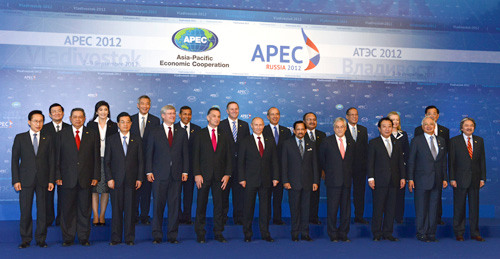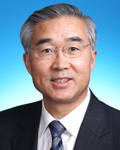|
 |
|
GATHERING: World leaders pose for a group photo during the 20th APEC Economic Leaders' Meeting in Vladivostok on September 9 (RAO AIMIN) |

APEC should continue to take a firm stand against all kinds of trade protectionism, safeguard a free and fair world trade system and play a more active role in world trade development
The 20th Economic Leaders' Meeting of the Asia-Pacific Economic Cooperation (APEC) forum wrapped up on September 9 in Russia's Far Eastern city of Vladivostok. With a theme entitled, "integrate to grow, innovate to prosper," economic leaders and representatives actively exchanged views on a wide range of issues, including trade and investment liberalization, regional economic integration, strengthening food security and establishing reliable supply chains, as well as cooperation to foster innovative growth.
Currently, the world economy is still in a slow recovery and some destabilizing factors and uncertainties remain. As a whole, the Asia Pacific maintains sound growth momentum, but the region should not overlook the impact brought about by the grave challenges facing the global economy. The regional cooperation and economic development of the Asia-Pacific region have been confronted with complicated new issues. Against the current backdrop, as the most prominent regional economic cooperation organization of the Asia Pacific, the achievements of the APEC Economic Leaders' Meeting this year aroused wide interest.
Broad consensus
The meeting proved to be successful after achieving a series of important agreements. All sides agreed to strengthen the grain market infrastructure, promote agricultural investment, enhance food security and improve access to food for vulnerable groups.
Under a Russian initiative, many agreements were reached on a more systematic approach to addressing existing chokepoints in supply chains through targeted capacity-building and concrete steps toward making supply chains more reliable, resilient, safe, efficient, transparent, diversified and intelligent.
The APEC economies also reached consensus on establishing an APEC technology platform, strengthening higher education cooperation among APEC members, as well as promoting small, medium and micro-sized enterprises for innovation-driven growth.
The free trade of environmental goods is of great positive significance for promoting green growth and free trade within the region. Meanwhile, it is to the benefit of all regional economies. Based on the consensus reached at the Honolulu meeting in 2011, this year the APEC economies made great progress via in-depth discussions on APEC's list of environmental goods. In the Vladivostok meeting, they endorsed a list of 54 items of environmental goods—primarily low-carbon, energy-saving green products—and agreed to reduce tariffs to 5 percent or less by the end of 2015. The endorsement is one of the most important milestones of APEC in the field of trade and investment liberalization.
China has kept a sincere and positive attitude in its approach to the environmental goods list and consulted with other members in a constructive spirit. Of the items on the list, 54 percent were proposed by China. During this process, China took full consideration of the interests of developing countries and aimed to ensure that those countries have access to environmental products without being affected by green barriers. China insists that when promoting the liberalization of environmental products, APEC members' different development stages and practical conditions should be taken into account. Also, it calls on developed members to assist developing members in enhancing their capability of developing green industries and achieving sustainable development.
There are several reasons why APEC members made much progress despite a gloomy world economy. The forum has put itself on the right side of history by helping promote economic development, improve people's lives and boost the prosperity of the Asia-Pacific region. Cooperation in these areas is the prime directive of APEC since it was established in 1989, and the essential purpose of all previous APEC leaders' meetings.
APEC fully respects the reality that the Asia-Pacific is a diversified and mutually dependent region. It pursues a pragmatic and flexible cooperation approach based on consensus in adherence to the principle of seeking commonalities while reserving differences.
APEC respects differences and handles disagreements among members appropriately. It tries to promote regional economic integration at different levels, in various scopes and through multiple channels, and has explored an efficient path for deepening economic cooperation among countries with diverse national conditions, varying development stages and different cultural backgrounds. Moreover, it has also developed a fairly sophisticated institutional framework and self-correcting reform mechanism.
| 